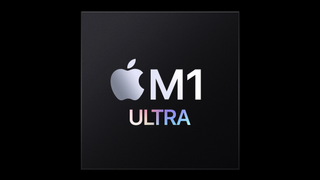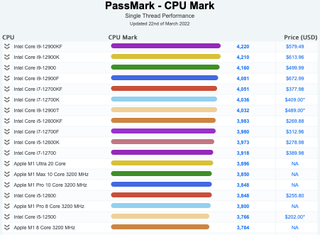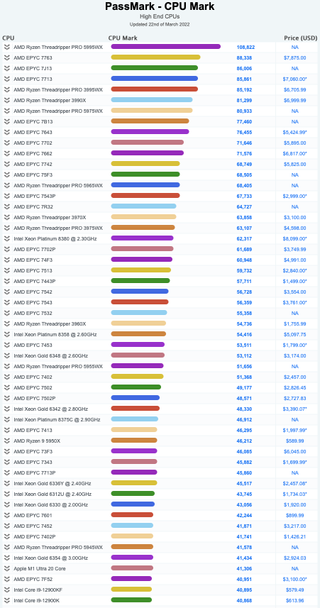Apple's M1 Ultra Benchmarked: 2.6X Slower Than AMD's Threadripper Pro 5995WX
It is fast, but not in every workload.

As more Apple's Mac Studio desktops end up in the hands of curious end-users, more details about their performance and features emerge. This time around someone has run PassMark Software's CPU benchmarks on a Mac Studio equipped with Apple's 20-core M1 Ultra processor. The chip demonstrated very good single-thread performance, its general CPU performance was ahead of most desktop CPUs, yet it could not compete against high-end workstation-grade processors.
Single-Thread: On-Par with Alder Lake
Apple's CPU developers have always strived to maximize single-thread performance of their designs as they rightly believed that this leads to lower power consumption of their smartphones and PCs. As a result, Apple's M1 is known for particularly strong single-thread performance and it is not really surprising that an M1 Ultra processor clocked at around 3.20 GHz is on par with Intel's Core i7-12700 that boosts its fastest core all the way to 4.90 GHz in PassMark's single-thread CPU performance benchmark (3,896 vs 3,918 points).

Like other M1s, Apple's M1 Ultra does not increase its clock speed significantly higher than 3.20 GHz. The M1 Ultra's massive system level caches (SLC) largely provides the maximum bandwidth required for single-thread workloads, even M1 Ultra's monstrous memory subsystem (800GB/s aggregated bandwidth) but it doesn't bring much difference with single-thread workloads when compared to M1 Max, M1 Pro or even M1. All of these system-on-chips are great when it comes to single-thread performance.
General CPU Workloads: 2.6 Slower than Threadripper Pro
Packing 16 high-performance Firestorm and four energy-efficient Icestorm cores, Apple's M1 Ultra promises some serious performance in multi-threaded workloads as well. Indeed, it scores 41,306 points in PassMark's CPU Mark that synthetically measures virtually all CPU capabilities, including integer, floating-point math, and things like compression, encryption, and physics simulation.
While 41,306 points in CPU Mark is a very good result that is even a bit higher when compared to Intel's Cores i9-12900KF (40,895) that can process more threads at once and has higher clocks in boost mode (albeit the same 3.20 GHz base), it is not high enough to be comparable to CPUs used in high-end workstations and servers.

AMD's 16-core Ryzen 9 5950X scores 46,212 points in the said test, whereas 64-core monster Ryzen Threadripper Pro 5995WX hits 108,882, beating Apple's top-of-the-range workstation CPU by 2.6 times. AMD's 64-core chip even with a base clock of 2.70 GHz simply has more computational resources than Apple's M1 Ultra, so in workloads that demand every single arithmetic logic unit or floating-point unit, Ryzen Threadripper Pro will always be faster.
Promises Vs. Facts
When Apple announces its latest computer hardware, it usually demonstrates benchmark results that present performance of its PCs in the best light possible. This tactic is hardly surprising, it is widely used in the industry. But in reality, there are other performance benchmarks and real-world use cases that at times contradict promises of unbeatable performance promised in ads and during presentation.
Stay on the Cutting Edge
Join the experts who read Tom's Hardware for the inside track on enthusiast PC tech news — and have for over 25 years. We'll send breaking news and in-depth reviews of CPUs, GPUs, AI, maker hardware and more straight to your inbox.
In general, if you need to choose between an M1 Ultra-based desktop or an AMD / Intel-based machine, you should probably check performance of such systems in your workloads rather than rely on benchmark results published over the Internet.

Anton Shilov is a Freelance News Writer at Tom’s Hardware US. Over the past couple of decades, he has covered everything from CPUs and GPUs to supercomputers and from modern process technologies and latest fab tools to high-tech industry trends.
-
spongiemaster What does 2.6x slower mean? If the 5995WX scores a 100, then the M1 Ultra scores -160?Reply
Apple's marketing is as full of it as any other tech company, but comparing an M1 Ultra to a 5995WX is flatly idiotic. 20 thread CPU loses to contemporary 128 thread CPU? Who could have predicted that? As expensive as the Apple Studio is, the 5995WX will cost more on its own without the rest of the computer. -
watzupken It just seems to me that after Apple announced the M1 Ultra, there are lots of reviews pitting it against something that is generally not good comparisons. This is one of them. While the Mac Studio with the M1 Ultra is not cheap, but pitting it against a CPU that draws significantly more power with more cores and threads just don’t make much sense to me. I use a combination of PC and Mac, but I‘ve never find comparing them meaningful. Macs are good for some workloads, and with the M1 chip making them even more efficient with these same workload. Threadripper contains no iGPU, so while it can brute force its way in some workload, it may not be as efficient or good in workloads that favour GPU acceleration.Reply -
salgado18 Reply
You may have missed last week's news that the M1 Ultra is as powerful as a 64-core Threadripper 3990X. This is to show that those numbers were just wrong, and the real performance of the 20-core M1 Ultra is closer to the 16-core i9-12900KF and lower than the 16-core Ryzen 5950X. But yeah, click-baitness abounds on the internet.spongiemaster said:What does 2.6x slower mean? If the 5995WX scores a 100, then the M1 Ultra scores -160?
Apple's marketing is as full of it as any other tech company, but comparing an M1 Ultra to a 5995WX is flatly idiotic. 20 thread CPU loses to contemporary 128 thread CPU? Who could have predicted that? As expensive as the Apple Studio is, the 5995WX will cost more on its own without the rest of the computer. -
salgado18 The news failed to point the most important part: the M1 Ultra has half the score of the Threadripper 3990X. That other news that both are equal is just plain wrong.Reply -
hotaru.hino Still waiting on those "industry standard benchmarks" that Apple mentioned to be revealed.Reply -
helper800 Reply
Listen, I'm no math genius either but this also logically means that the 5995wx is 2.6x faster than the M1 Ultra. With 100 score as a baseline for the 5995 that means the M1 would be approximately 0.384615 times as fast. So effectively what is being said is that the M1 Ultra is 38.4615% as fast as the speed of the 5995wx.spongiemaster said:What does 2.6x slower mean? If the 5995WX scores a 100, then the M1 Ultra scores -160? -
peachpuff Reply
Probably because Apple said that it's better than everything out there.watzupken said:It just seems to me that after Apple announced the M1 Ultra, there are lots of reviews pitting it against something that is generally not good comparisons. -
spongiemaster Reply
The 3990x comparison did not come from Apple and it was repeatedly pointed out that the 3990x result was way too low.salgado18 said:You may have missed last week's news that the M1 Ultra is as powerful as a 64-core Threadripper 3990X. This is to show that those numbers were just wrong, and the real performance of the 20-core M1 Ultra is closer to the 16-core i9-12900KF and lower than the 16-core Ryzen 5950X. But yeah, click-baitness abounds on the internet. -
spongiemaster Reply
2.6x faster makes sense, 2.6x slower does not. If you're driving 30 mph and someone passes you doing 60mph. No one is going to say you are driving twice as slow as he is. That makes no sense. You're driving half as fast or 50% slower, not 200% slower.helper800 said:Listen, I'm no math genius either but this also logically means that the 5995wx is 2.6x faster than the M1 Ultra. With 100 score as a baseline for the 5995 that means the M1 would be approximately 38.4615. So effectively what is being said is that the M1 Ultra is 38.4615% the speed of the 5995wx. -
deesider The Ultra basically matches the 12-core Threadripper PRO 5945WX .Reply
On one hand that is a little disappointing, but on the other hand, the Apple Studio certainly wipes the floor with it's rivals based on case volume :)
Most Popular





